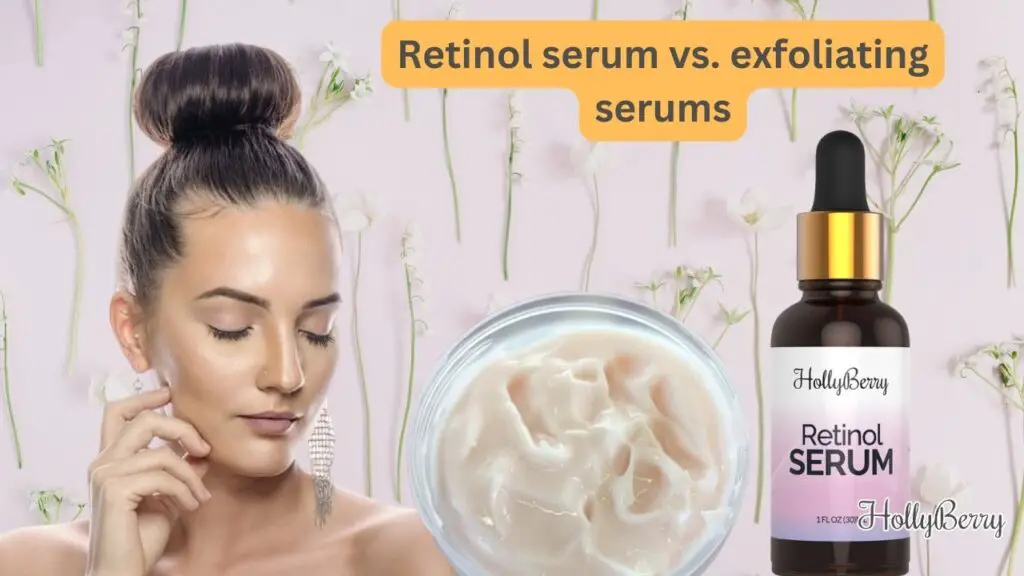
When it comes to skincare, there are countless products to choose from, each promising to provide unique benefits to the skin.
Retinol serum and exfoliating serums are two such products that have gained popularity in recent years. Both these serums can help improve the texture, tone, and overall health of your skin, but they work in different ways.
In this article, we will compare Retinol serum and exfoliating serums and help you understand the key differences between the two.
Understanding Retinol Serum
Retinol serum is a type of serum that contains vitamin A and is known for its anti-ageing properties. It is often used to reduce the appearance of fine lines and wrinkles, improve skin texture and tone, and boost collagen production.
Retinol serum works by speeding up the cell turnover rate, which means it helps to remove dead skin cells and encourages the growth of new cells. This process can help to unclog pores, reduce hyperpigmentation, and improve the overall appearance of the skin.
There are different types of Retinol serum available, ranging from low to high strength. It is essential to choose the strength that is suitable for your skin type and start with a lower concentration before working your way up.
Retinol serum may cause side effects such as redness, dryness, and flaking, especially if used incorrectly. Therefore, it is vital to follow the instructions carefully and consult a dermatologist if necessary.
Understanding Exfoliating Serums
Exfoliating serums, on the other hand, are designed to remove dead skin cells from the surface of the skin. They contain ingredients such as alpha-hydroxy acids (AHAs) and beta-hydroxy acids (BHAs), which can help to unclog pores, reduce the appearance of fine lines and wrinkles, and improve skin texture and tone.
Exfoliating serums work by gently dissolving the bonds between dead skin cells, allowing them to be easily removed from the surface of the skin.
Like Retinol serum, there are different types of exfoliating serums available, including glycolic acid, lactic acid, and salicylic acid.
It is essential to choose the right type of exfoliating serum that suits your skin type and concerns. Overuse or incorrect use of exfoliating serums can lead to side effects such as redness, irritation, and dryness.
Retinol Serum vs. Exfoliating Serums: The Key Differences
Although both Retinol serum and exfoliating serums can improve the texture and tone of your skin, they work differently. The primary difference between these two serums lies in their ingredients and how they work.
Retinol serum contains vitamin A and works by speeding up the cell turnover rate, while exfoliating serums contain AHAs and BHAs and work by dissolving the bonds between dead skin cells.
Another difference is in the benefits they provide. Retinol serum is primarily used to reduce the appearance of fine lines and wrinkles, improve skin texture and tone, and boost collagen production. On the other hand, exfoliating serums are primarily used to unclog pores, reduce hyperpigmentation, and improve the overall appearance of the skin.
When it comes to side effects, Retinol serum may cause dryness, redness, and flaking, while exfoliating serums may cause irritation and dryness. It is crucial to choose the right serum that suits your skin type and concerns to avoid any adverse effects.
How to Incorporate Retinol Serum and Exfoliating Serums in Your Skincare Routine
If you want to incorporate Retinol serum and exfoliating serums into your skincare routine, there are some tips you should follow. When using Retinol serum, start with a lower concentration and work your way up gradually to avoid any adverse effects. Use it at night and apply a moisturizer on top to prevent dryness.
When using exfoliating serums, start with once or twice a week and gradually increase the frequency. Always follow up with a moisturizer and sunscreen to protect your skin from the sun’s harmful rays. It is also essential to avoid using Retinol serum and exfoliating serums together as it can lead to irritation and dryness.
Our conclusion
Retinol serum and exfoliating serums are two popular skincare products that can help improve the texture, tone, and overall health of your skin.
While Retinol serum is primarily used for anti-ageing benefits, exfoliating serums are used to unclog pores and improve skin texture and tone. Both these serums work differently and have their benefits and side effects.
It is essential to choose the right serum that suits your skin type and concerns and follow the instructions carefully to avoid any adverse effects.
FAQs: For Retinol serum vs. exfoliating serums
Is it safe to use Retinol serum and exfoliating serums together?
It is not recommended to use Retinol serum and exfoliating serums together as it can lead to irritation and dryness.
Can Retinol serum be used during the day?
Retinol serum is best used at night as it can increase the skin’s sensitivity to the sun.
How often should I use exfoliating serums?
Start with once or twice a week and gradually increase the frequency depending on your skin’s tolerance.
Can I use Retinol serum and exfoliating serums if I have sensitive skin?
If you have sensitive skin, it is best to consult a dermatologist before using Retinol serum and exfoliating serums.
How long does it take to see results from using Retinol serum or exfoliating serums?
It can take several weeks to months to see visible results from using Retinol serum and exfoliating serums, depending on your skin’s concerns and the frequency of use. Consistency is key, so it’s essential to use these serums regularly to see the desired results.


